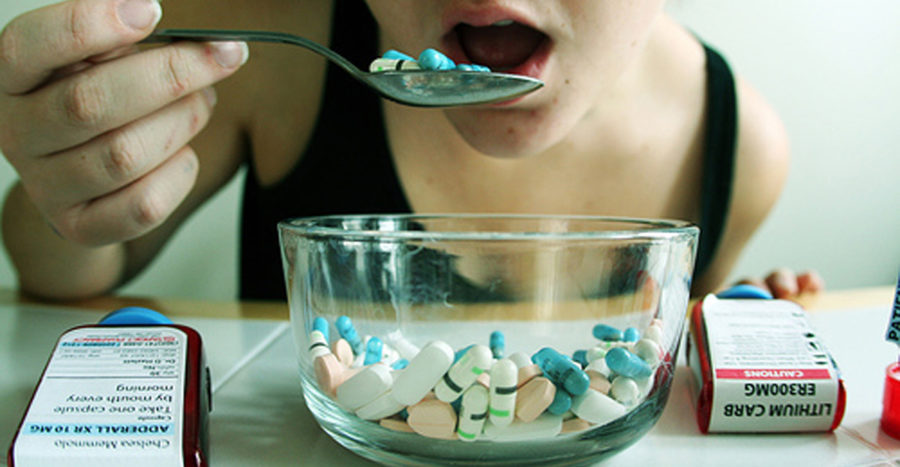Balancing school work and the freedom of living on one’s own can make any first-time college students feel unorganized, distracted and overwhelmed.
This is natural, but when symptoms persist semester-after-semester and get in the way of thriving in college, some students discover they have had an underlying cause for it all along.
“In high school, I made A’s on every test I studied for, so my mom became concerned when I made a 2.7 for my (second semester of college),” Lauren English said. “I’ve always been a forgetful, disorganized person but I never showed any signs of being inattentive or hyperactive.”
English’s mother called one night to ask English, a sophomore nursing major, if she had completed any of her A&P II assignments. English realized she had forgotten all about the assignments, despite the insistent warnings about the deadline from peers and instructors.
“For the first time in my life, my mom was disappointed in me,” English said. “She felt that I just didn’t care about college anymore because for two-and-a half semesters, she’d done everything to help me better my grades,” English said. “I started to believe all the dumb blonde jokes hurled at me in high school.”
Instead of falling to the belief she was unfit for college, English and her family sought professional help.
After a series of tests and paying a hefty fee, English was diagnosed with Attention Deficit Hyperactivity Disorder – the inattentive type – and was prescribed Adderall.
“My grades shot up within weeks,” English said. “The effects were truly amazing.”
Dr. Mark Thomas of The University of Alabama would not be surprised with English’s case. Thomas researches how ADHD is managed on college campuses.
He explained in an interview with Psychcentral that someone with ADHD could build coping mechanisms in early childhood and high school that later crumble in college.
But at this point, diagnosis can often be difficult for students since their primary care doctor is not around, and they rely on campus clinics.
“There are guidelines (for diagnosing children) that the American Academy of Pediatrics has come up with,” Thomas told Psychcentral. “There are also guidelines that psychiatric associations have prescribed for grownups. What are really lacking are guidelines for adolescents and young adults, college age in particular.”
Thomas studied 124 schools across the nation and has found many campuses did not include prescription medication as a treatment option for students.
“While students on these campuses could presumably go off-campus to receive this service, not having it readily available on-campus may provide a significant barrier to receiving care,” Thomas said.
But English’s scenario is not always the case for those seeking ADHD medications, and many colleges do not include ADHD medication in their clinics for this reason.
In fact, some schools, such as Duke University in North Carolina, have forbidden performance-enhancing drugs in their honor codes.
A 2014 poll revealed that nearly 1 in 5 students of an unnamed Ivy League school misused ADHD medications to improve their school performance on a non-prescribed basis.
“I don’t think this is a phenomenon that’s necessarily any greater a problem in the ‘Ivies’ than anywhere else,” said Andrew Adesman, lead researcher of the poll and developmental pediatrician, in an interview with USA Today.
The vast majority of these students obtained the drug from someone diagnosed with ADHD.
“I get approached for my Adderall as frequently as three to four times a week,” English said. “I trust the people around me, but I do not trust the pressure to do well in school, so I always keep them hidden.”
And she claims it takes a lot of sacrifice for focus.
“As much as my medication helps me, there is a constant battle between my mind and my body,” English said. “It’s really confusing when your stomach is loudly growling constantly, but you’re thinking, ‘I’m not even the slightest bit hungry.’”
Side effects of the drugs include feeling restless, finding it difficult to fall asleep, loss of appetite, headaches, upset stomach, irritability, depression, dizziness, racing heartbeat and tic, according to ADHD.com.
In fact, since ADHD medications are often stimulant-based, it can heighten the effects of other conditions within the body. Drugs.com claims such misuse has resulted in sudden death, especially in those with serious heart problems or congenital heart defects.
Mental side effects are common amongst many as well.
“On top of the eating problems, I’ve never experienced more anxiety in my life,” English said.
Others, such as senior Charlotte McLoughlin, have experienced similar side effects.
“I was put on Adderall after I was diagnosed ADHD with anxiety in the fifth grade. The medication was terrible, making me suicidal and not wanting to eat,” McLoughlin said.
McLoughlin was later re-prescribed to a different medication in college, one that helps her balance her athletics and academics without the side effects.
McLoughlin said in the case that Southern Miss decided to take a route like Duke, it would be successful if it centered around drug-testing programs like that of the NCAA.
“The NCAA tests for Adderall (and other drugs) in random drug tests throughout the year,” McLoughlin said. “If you don’t have a prescription on file in the training room, you can get in lots of trouble.”
“I know students would like to do well in school, but if they just want to study for a final, then I have a hard time justifying their abuse of the drug that helps, and, in the process, hurts so many,” English said.






























